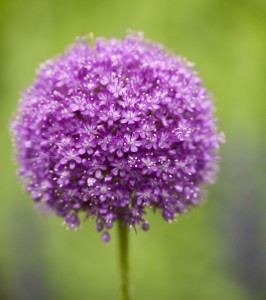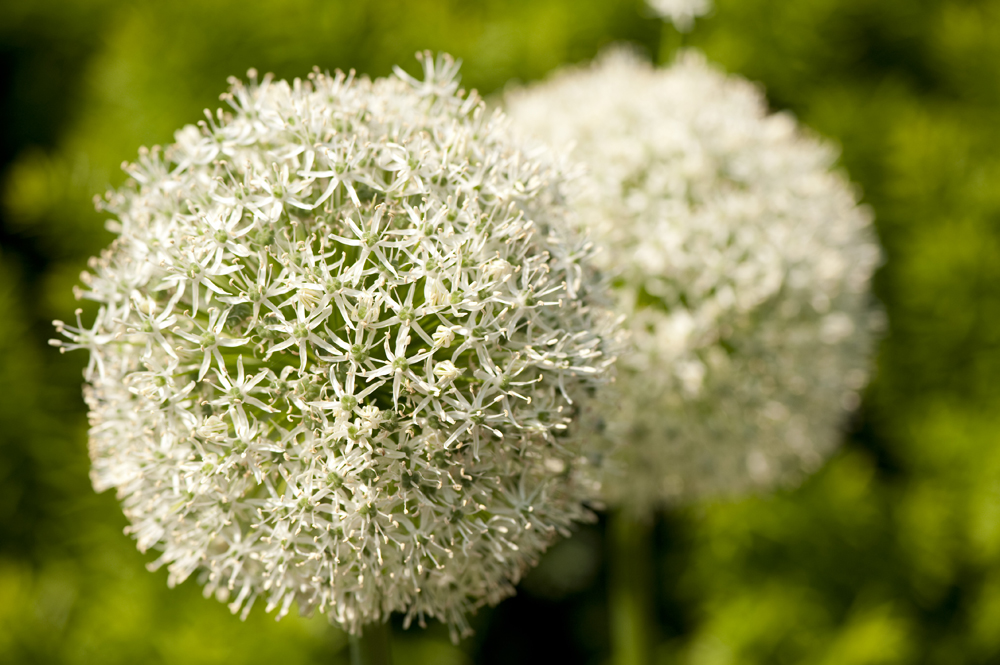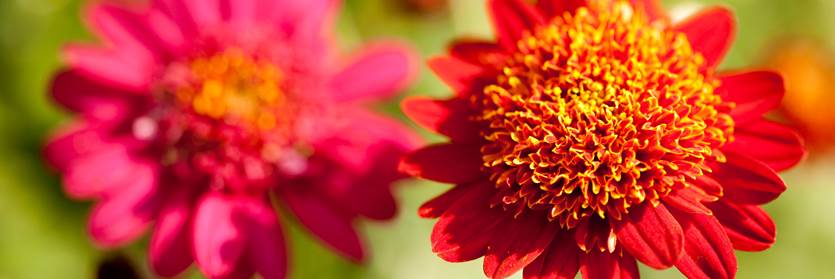All-Purpose Alliums
Posted in Horticulture on June 6 2014, by Brian Sullivan
Brian Sullivan is the Vice President for Landscape, Gardens and Outdoor Collections. He oversees the care, presentation, and development of the outdoor gardens and landscape management of the Garden’s 250 outdoor acres.

When choosing a new plant to add to a garden, some people choose plants for beauty. Others choose plants with a purpose, for example a shade tree or an upright evergreen for structure in the garden. Well, isn’t it nice to find a plant that fills more than one need?
One such plant is the ornamental allium. If that name sounds familiar, it should. There are many species and cultivars of the genus Allium, which include the well-known chives, onions, and garlic.
The flower appears to be a single, spherical flower borne on single upright stems. However, the globes are actually made up of many small, star-shaped flowers radiating out from the center. Alliums come in many sizes. The flower heads range from tiny to quite large, and the density of the flowers can be quite full, creating a dense flower head; or very open, making for an airy flower head. The stems also range from a short 12” to an astounding 36”. Colors can range from dark purple to the light pink, with some white cultivars. The different species and cultivars can be massed in large numbers or mixed all together for varying effects in the garden.
Alliums’ small, simple florets are highly attractive to bees and butterflies. They are grown from bulbs and are best planted with other bulbs in the fall for flowers the following spring. There is a great variety offered from catalogs and online retailers. Alliums’ perfectly spherical flowers bloom late in the spring and into early summer, when the other bulbs, such as tulips and daffodils, are finished for the season. They are an easy way to extend the bulb season as early summer ramps up in the garden. Leave the bulbs in place and undisturbed; they will persist in the garden for many years.
One drawback is that the leaves will yellow quickly, either before or during the flowering. But since the leaves’ job of replenishing the bulb for next year’s flower is done, it is okay to come through and cut off the yellowing leaves. When you set about removing the stems and spent flower heads is up to you. They can remain in the garden for their dried flower heads to provide interest and structure while the summer perennials are filling. They also make great dried, long-lasting material for decorating.

Beyond all the wonderful features of the alliums already discussed, alliums have additional beneficial uses in the garden. They create natural antibiotic and antifungal chemical compounds, making them a perfect garden companion to other plants. At NYBG we use them in several gardens, notably as companions in the Daylily/Daffodil walk to add interest after the daffodils finish, but before the daylilies have opened. In the Peggy Rockefeller Rose Garden, we have inter-planted them among the roses. Many of the most common rose diseases are fungal. The roses’ immunity to fungal spores gets a boost from their allium garden companions. And if all this is not enough to convince you to try alliums in the garden, how about this: they are deer-resistant.


I’m a member of the NYBG. Saturday, I spent a day at the Garden Saturday to celebrate my birthday with one of your great volunteers (Margaret H.)…In fact Margaret & I went to the nearby Aquinas HS on 182nd Street & Belmont Ave many years ago…My family had a house in the Bronx not far from the Garden. He had the most fantastic garden filled with vegetables, flowers & many varieties of roses. He shared his bounty (unwittingly, the local squirrels) and with our neighbors & they loved it. You may be able to help me out with something he always told us…to keep away red ants, plant plenty of scallions around the garden. Now, I know we never had red ants, but my daughter in NC is plagued by them. Her neighbors use pesticides but she & her husband refuse to do so. They does everything organically. Her children always have to wear shoes & her husband has gotten badly bitten when mowing the lawn. She couldn’t plant her garden this year even though it is boxed and above ground level. Can you give me any advice to help her? I’m afraid I do not blog & request a reply via email to proviedegnan@aol.com. Thank you. Very Sincerely, Providence